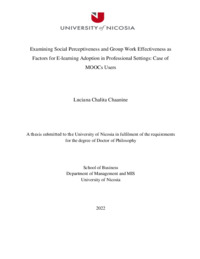- Chaanine, Luciana
- School of Business
- Department of Management
- May 2022
- English
- 228 pages
- Kokkinaki, Angelika | Maamari, Bassem | Melanthiou, Yioula
- E-learning | MOOCs | Technology adoption | UTAUT | Social perceptiveness | Group work effectiveness
- Business Administration -- Management and MIS
-
-
The need for e-learning and more specifically MOOCs (Massive Open Online Courses) has been increasing especially after the COVID19 pandemic. Although there have been many studies about them, rare are the ones that look at them in a professional setting since most of the existing literature focuses on e-learning in academia. The current research seeks to investigate this trend by examining the factors that influence MOOC adoption by professionals. A conceptual model was developed by extending the Unified Theory of Acceptance and Use of Technology (UTAUT). A survey along with a test for the respondents’ Social Perceptiveness was conducted with 253 questionnaires retrieved for analysis from professionals who had attended MOOCs. The research findings show that users’ behavioral intention to attend MOOC is influenced mainly by Effort Expectancy and Facilitating conditions when the emphasis is on Time Flexibility and Continuous availability of these courses. Performance Expectancy and Social Influence specifically were found to have less significant influence on MOOC usage intention. The effect of Social Perceptiveness and Group Work Effectiveness were also analyzed as moderators and results show that Social Perceptiveness has an effect on Social Perceptiveness while Group Work Effectiveness has an effect on Effort Expectancy. The findings help researchers, practitioners and MOOCs designers to reach a better understanding of users’ continued intention to use and attend MOOCs. The implications and limitations of this research are also described.
-
Examining Social Perceptiveness and Group Work Effectiveness as Factors for E-learning Adoption in Professional Settings: Case of MOOCs Users
Main Files
 Full text
Full text
Description: FINAL VERSION- PHd dissertation Thesis-LUCIANA CHAANINE.pdf (pdf) Book Reader
Size: 6.2 MB
| Type | Location | Link |
|---|---|---|
| dissertation | [More information] |

